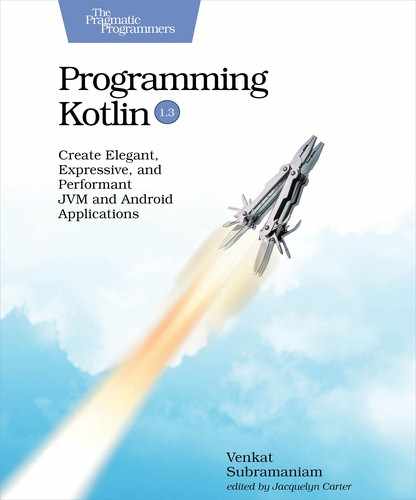Prefer val over var
To define an immutable variable–that is, a constant or a value—use val, like so:
| | val pi: Double = 3.14 |
Unlike Java, where you’d place the type before the name of the variable, in Kotlin you place the name of the variable first, then a colon, followed by the type. Kotlin considers the sequence Java requires as “placing the cart before the horse” and places a greater emphasis on variable names than variable types.
Since the type of the variable is obvious in this context, we may omit the type specification and ask Kotlin to use type inference:
| | val pi = 3.14 |
Either way, the value of pi can’t be modified; val is like final in Java. Any attempt to change or reassign a value to variables defined using val will result in a compilation error. For example, the following code isn’t valid:
| | val pi = 3.14 |
| | |
| | pi = 3.14 //ERROR: val cannot be reassigned |
What if we want to be able to change the value of a variable? For that, Kotlin has var—also known as “keyword of shame.” Variables defined using var may be mutated at will.
Here’s a script that creates a mutable variable and then modifies its value:
| | var score = 10 |
| | //or var score: Int = 10 |
| | |
| | println(score) //10 |
| | |
| | score = 11 |
| | println(score) //11 |
Mutating variables is a way of life in imperative style of programming. But that’s a taboo in functional programming. In general, it’s better to prefer immutability—that is, val over var. Here’s an example to illustrate why that’s better:
| | var factor = 2 |
| | |
| | fun doubleIt(n: Int) = n * factor |
| | |
| | factor = 0 |
| | |
| | println(doubleIt(2)) |
Don’t run the code; instead eyeball it, show it to a few of your colleagues and ask what the output of the code will be. Take a poll. The output will be equal to what most people said it will be—just kidding. Program correctness is not a democratic process; thankfully, I guess.
You probably got three responses to your polling:
- The output is 4.
- The output is 0, I think.
- WHAT—the response the code evoked on someone recently.
The output of the above code is 0—maybe you guessed that right, but guessing is not a pleasant activity when coding.
Mutability makes code hard to reason. Code with mutability also has a higher chance of errors. And code with mutable variables is harder to parallelize. In general, try really hard to use val as much as possible instead of var. You’ll see later on that Kotlin defaults toward val and immutability, as well, in different instances.
Whereas val in Kotlin is much like Java’s final, Kotlin—unlike Java—insists on marking mutable variables with var. That makes it easier to search for the presence of var in Kotlin than to search for the absence of final in Java. So in Kotlin, it’s easier to scrutinize code for potential errors that may arise from mutability.
A word of caution with val, however—it only makes the variable or reference a constant, not the object referenced. So val only guarantees immutability of the reference and doesn’t prevent the object from changing. For example, String is immutable but StringBuilder is not. Whether you use val or var, an instance of String is safe from change, but an instance of StringBuilder isn’t. In the following code, the variable message is immutable, but the object it refers to is modified using that variable.
| | val message = StringBuilder("hello ") |
| | |
| | //message = StringBuilder("another") //ERROR |
| | |
| | message.append("there") |
In short, val only focuses on the variable or reference at hand, not what it refers to. Nevertheless, prefer val over var where possible.
